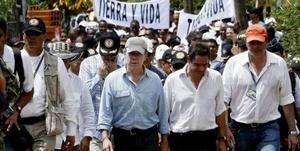This past Saturday Colombian president Juan Manuel Santos and his government celebrated a media blitz in Necocli, Antioquia, when they launched Santos's plan to return some of the lands that were forcefully taken from millions of peasants over the course of the last twenty years. In my previous blog I pointed out that the Colombian Banana Growers Association (AUGURA)—the group that represents that banana agribusiness in Urabá (a subregion of the Colombian departments of Antioquia, Choco and Cordoba)—has voiced its concern over Santos's move. AUGURA is one of the major forces that has benefited from this land grab.
 Alongside the AUGURA is also the Cattle Ranchers Fund of Córdoba, which allegedly has taken possession of about 46,000 hectares of the best lands in the nearby Colombian department of Córdoba through fraudulent methods and violence. These lands are just a small piece of the almost 6 million hectares that were forcefully appropriated over the last two decades. The African Palm agribusinesses and mining companies also joined the land grab frenzy facilitated by the right wing paramilitaries in a move that may have championed the bloodiest and most violent process of capitalist transformation in Latin America. The process lead to a political economy largely based on agribusinesses, land speculation, and the extraction of mineral resources and oil. It left tens of thousands dead and more than 4 million internally displaced.
Alongside the AUGURA is also the Cattle Ranchers Fund of Córdoba, which allegedly has taken possession of about 46,000 hectares of the best lands in the nearby Colombian department of Córdoba through fraudulent methods and violence. These lands are just a small piece of the almost 6 million hectares that were forcefully appropriated over the last two decades. The African Palm agribusinesses and mining companies also joined the land grab frenzy facilitated by the right wing paramilitaries in a move that may have championed the bloodiest and most violent process of capitalist transformation in Latin America. The process lead to a political economy largely based on agribusinesses, land speculation, and the extraction of mineral resources and oil. It left tens of thousands dead and more than 4 million internally displaced.
As mentioned in my previous posting, the challenge confronting Santos and his government is this: Can this government withstand the resistance of the formidable forces that benefited from this land grab?
What Colombia needs is land distribution that puts more land in the hands of the campesinos and small farmers in order to reactivate small peasant production. This requires, however, a radically different economic model than the dominant extractive-rentier system Colombia has now.
See "President Santos and the Question of Land Reform in Colombia (Part I)"
For more from Nazih Richani's blog, Colombian Cuadernos, visit nacla.org/blog/cuadernos-colombianos, or see the July/August 2009 NACLA Report, "Coercion Incorporated: Paramilitary Colombia." See also "Show Time in Necocli, Colombia" and "Colombia's Catch 22: Undermining the Victims' Law," by Nazih Richani, and "Victims Law Decree Fails Afro-Colombian Communities," by Charo Mina-Rojas.

